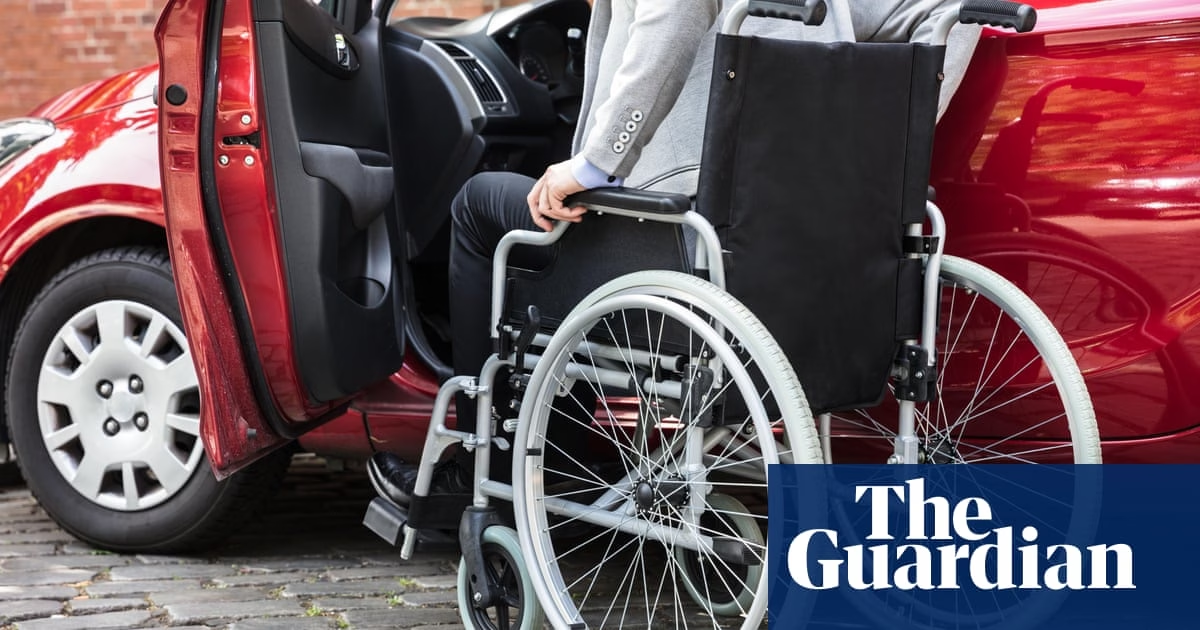<
div>
Good morning. Motability really ought to be a boring subject. A government scheme designed to help people with serious disabilities get a car by using a portion of their benefits to pay for the lease doesn’t sound like fertile territory for a scandal, after all. But over the last week, anyone who had never heard of Motability before would have got a much more lurid impression.
First in the Daily Mail last Saturday, and then in a string of stories spinning off the same basic analysis, Motability was portrayed not as a useful mechanism for reducing some of the inequities that always accompany disability – but an outrageous example of con artists milking the taxpayer to live a life of luxury. The saga took in “bedwetting boy racers”, so-called “sickfluencers” teaching fellow chancers how to cheat the system, an anonymous social media user who has previously caught the eye of Elon Musk and even the legacy of the Battle of Britain.
It may seem touchingly naive to imagine that the facts can get in the way of such an irresistible narrative, but let’s give it a go all the same. Today’s newsletter, with the help of Dr Mark Carew, of the London School of Hygiene and Tropical Medicine’s International Centre for Evidence in Disability, explains why you do not need to worry that your taxes are being wasted on “free cars for fat people” – and why the story caught light anyway. Here are the headlines.
Five big stories
UK economy | Keir Starmer has been warned against “appeasing” Donald Trump as he considers reducing a major tax for US tech companies while cutting disability benefits and public sector jobs. Chancellor Rachel Reeves confirmed on Sunday that there were “ongoing” discussions about the UK’s £1bn-a-year digital services tax.
Canada | Canada’s prime minister, Mark Carney, has called a snap election on 28 April, firing the starting gun on a contest expected to focus on the strained relationship with the US amid threats to Canada’s economic and political future. Carney’s decision comes as the Liberals experience an unprecedented polling swing putting them ahead of the Conservatives.
Gaza | Malnutrition is spreading in Gaza, medics and aid workers in the devastated Palestinian territory are warning, as a total Israeli blockade of all supplies enters its fourth week. On Sunday, Palestinian officials said the total death toll from nearly 18 months of conflict had passed 50,000.
Heathrow | There was enough power for Heathrow to remain open during the entire period it was shut down on Friday, the head of National Grid has said. Speaking for the first time since a fire forced North Hyde substation to close, the National Grid chief executive, John Pettigrew, said two other substations that serve Heathrow were working and could have supplied the airport.
Turkey | An Istanbul court has formally arrested the city’s mayor, Ekrem İmamoğlu, on corruption charges, sending him to pre-trial detention on the day he received his party’s nomination to run for president. Tens of thousands of demonstrators gathered in the city after days of tension sparked by İmamoğlu’s initial detention in a dawn raid earlier this week.
In depth: How the Motability ‘scandal’ was laundered into the mainstream
Before the Motability scheme was created in 1977, the government’s offer to disabled people was something called the Invacar – a cartoonish three-wheeler that was eventually phased out because it had a habit of toppling over. The row over the Motability scheme is a measure of how far we’ve come – and some of the prehistoric attitudes that remain.
“Disabled people face so many barriers in accessing transport,” Mark Carew said. (Full disclosure: he co-wrote a report which received funding from Motability in 2023.) “Whether it’s train stations that aren’t wheelchair accessible, or no ramp available when you’ve booked it, or other travellers refusing to get out of the wheelchair space – there are lots of reasons Motability is important.”
But that story hasn’t got a lot of airtime in recent days. The claim, instead, is that many Motability customers don’t need a car at all, and are getting luxury vehicles at the taxpayer’s expense: that, to quote shadow welfare secretary, Helen Wheatley, this is “a classic case of a well-intentioned initiative that has got way out of hand”. So how much of that is true?
How does the scheme work?
As a parliamentary report noted last week, 29% of disabled adults do not have access to a car, against 16% of non-disabled adults. They are more likely to be struggling financially, and to need help from a family member or carer to travel. The Motability scheme is intended to help mitigate those problems.
The scheme is run by a private company, overseen by a charitable foundation, that buys new cars, then leases them to claimants for three years before selling them on. The lease payments come from government benefits, usually a portion of the personal independence payment, the main working-age benefit for people with disabilities. The recent scrutiny is based partly on the remarkable growth in the numbers eligible – with the customer base rising by about 200,000 in two years, to 815,000.
There have been reasonable criticisms over high executive pay and warnings that Motability is sitting on excessive reserves – £4bn in September last year. But the money made from used cars goes back into the scheme, not to shareholders – and all in all, “it clearly delivers value for the taxpayer,” Carew said.
“But it’s not just about that. People with disabilities aren’t aliens – we’re the friends and family of everyone else. This is a powerful way for them to make choices that go some way to level the playing field.”
Why should people with disabilities get a new car for free on top of their benefits?
A common refrain in the coverage – “Do you want a free new car?” the Times’ Alice Thomson asked – but one which misses a central point: the Pip funding that goes to Motability is money that customers would have been getting anyway.
If they weren’t getting a car, they’d have it to spend on something else. And if they want a more expensive car – perhaps needing a bigger vehicle for essential equipment, perhaps shockingly able to have preferences despite also having a disability – they have to make a down payment out of their own pocket.
The cars are new, meanwhile, so that they retain a significant resale value at the end of the lease. “It’s just not true that it’s ‘free’,” Carew said. “And because it comes out of an existing Pip award, it’s at no additional cost to the taxpayer.” Scrapping Motability wouldn’t save a penny from the benefits bill.
Shouldn’t prestige brands be excluded?
Another prominent claim: Motability is giving “subsidised BMWs” and “50-grand Mercs” to people who don’t need them. And it’s true that if you search the Motability website, you can find premium cars (subject to the additional upfront fee, of up to £8,000).
But the vast majority of Motability cars are much more ordinary, except when they’re specialised vehicles with space for a wheelchair: economy brands make up 94% of the fleet. And there’s a ceiling of £45,000 on petrol and diesel cars (£55,000 for electric), because cars costing more than that depreciate too fast to be viable.
Because of that upfront fee, the cost to the taxpayer of the more expensive models is exactly the same. The fact that the lease only lasts three years is, likewise, motivated by the fact that selling on older cars would mean a worse return. The cherrypicking coverage implies that disabled people shouldn’t get a choice: instead, they should exist in a state of constant gratitude, and piss off in their wonky three-wheeler.
But aren’t people who wet the bed or who have Munchausen syndrome taking advantage of the scheme?
Perhaps the most misleading claim, visible in many variants. Cars are going to “bed-wetting boy racers”, said Reform MP Richard Tice. In the Daily Mail, Richard Littlejohn asked: “Why should you get a free car simply because you’re fat?” And in the Daily Telegraph, Allison Pearson told us: “If I said I felt depressed or constipated … [the government] might give me a BMW.”
Leo McKinstry in the Daily Express even suggested that it was a symptom of the “cringing surrender” that meant Britain was no longer the country Battle of Britain heroes fought to defend. This stuff obviously writes itself – or might as well do for the amount of factchecking involved.
All these claims can be traced back to the Daily Mail’s first article. “Pip ‘mobility’ claimants do not actually have to have a physical disability to qualify for a Motability vehicle,” it said. “Claimants with a mental health condition, such as anxiety, can also apply.” Then it cited approval rates for bedwetting, or enuresis (35%), ADHD (49%), obesity (77%), agoraphobia (66%), and Munchausen syndrome, a condition where the sufferer fakes a medical condition for attention (54%).
But those figures cover any level of Pip, not the higher mobility payment needed for Motability. Yes, 54% of people who claimed Pip with Munchausen syndrome in October 2024 were approved – but that only amounted to six successful claimants. There were 41 with enuresis. Those figures tell us nothing about how many got the higher rate. But the scoring system would not put them in that category without a significant physical impairment if they were able to follow a route without help from another person, a technological aid, or an assistance dog.
<
p class=”dcr-h5yx72″>There were likely more for some of the other categories, which have a much larger base – but what is certain is that the vast majority
Source: https://www.theguardian.com/world/2025/mar/24/monday-briefing-motability-myth








